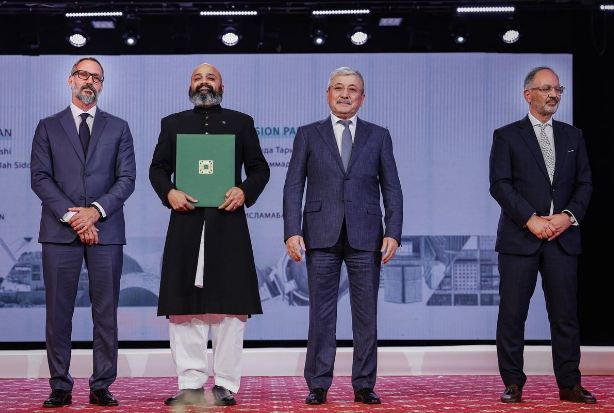BISHKEK, SEPT 16 /DNA/ – Seven architectural projects that shield communities from climate risk, preserve cultural heritage and create affordable housing were honoured this evening at the Aga Khan Award for Architecture prize-giving ceremony at the Kyrgyz National Philharmonic Hall.
The Aga Khan accompanied His Excellency Adylbek Kasymaliev, Chairman of the Cabinet of Ministers of the Kyrgyz Republic, to preside over the ceremony. The winning designs, which will share a prize of US $1 million, demonstrate the power of architecture to address some of humanity’s most pressing challenges. Projects include flood-resistant bamboo homes that can be relocated when rivers shift; an incremental, community-led restoration of urban heritage; and a community centre that transforms abandoned oil company ruins into lively public space.
Distinguished laureates joined national officials, architecture experts, the Award’s Steering Committee and Master Jury, and other dignitaries for the event, which marks the culmination of the Award’s 16th triennial cycle. A series of events this week in Bishkek have brought together architects, designers, policymakers and community leaders to celebrate the transformative potential of architecture and urban planning to improve the world.
Vision Pakistan was one of the winners, placing Pakistan at the forefront of global recognition for social transformative and climate conscious design. Vision Pakistan in Islamabad, by DB Studios is a multistorey facility boasting joyful facades inspired by Pakistani and Arab craft, while housing a charity that aims to empower disadvantaged youth through vocational training. The Jury noted that the building not only contains a new type of education, but is full of light, spatially interesting and economically efficient.
Established by His late Highness Prince Karim Aga Khan IV in 1977, the Aga Khan Award is unique among architecture prizes. It spotlights projects that not only demonstrate design excellence but also improve quality of life, and considers the contributions of municipalities, builders, clients, master artisans and engineers alongside architects. Since its inception, the Award has recognised more than 130 projects worldwide, influencing the global discourse on architecture in the Muslim world and beyond.
The Aga Khan elaborated on the importance of this pursuit: “Today, with the climate more volatile than ever, architects have a great responsibility, and an opportunity, to use their creativity to design the buildings that will buffer that volatility and protect us all – and especially the most vulnerable – from climatic risk,” he said. “This quality – flexibility in the face of the unexpected – was at the heart of the jury’s concerns in this cycle of the award.”
As well as environmental justice, the built environment is well placed to help solve issues of social justice, His Highness explained in his address: “It is not an exaggeration to say that affordability of our housing, ease of access to green space, education, health and cultural heritage all hinge on the creativity of our architects and the wisdom of our civic planners.” Buildings, he added, have the power to raise living standards, inspire reverence and solve problems for generations to come. “Great architecture,” he went on to say, “has the power to answer directly to the most acute development challenges, and to create the inclusive, safe, dignified world that we want for everyone.” Earlier in the day, His Highness also attended a special stamp cancellation ceremony, in which the Kyrgyz postal service issued a specially designed postage stamp to commemorate this year’s Award ceremony in Bishkek.

















